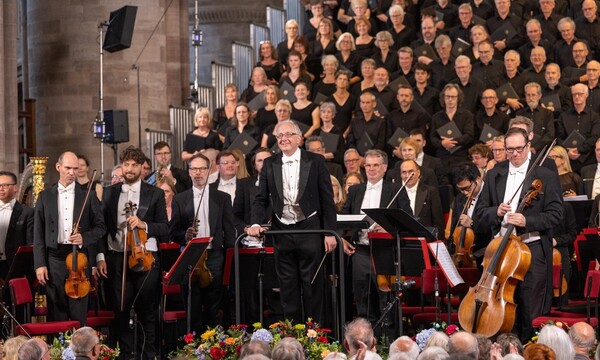News Story

75 years ago, in 1946, the Three Choirs Festival was revived in Hereford after a gap of seven years during the Second World War. Much of that year’s festival was carried over from the fully-planned programme for 1939, which had been cancelled at the outbreak of war days before it was due to take place. So, as we contemplate the shape of a post-Covid world, the theme of the 2022 Hereford festival is one of re-imaginings. The week begins with a rare performance of Dvořák’s Requiem; this was his counter-suggestion when he was invited to set Cardinal Newman’s poem The Dream of Gerontius, whichfor some reason did not appeal to him. Fortunately, this text was more to Elgar’s taste and at the other end of the week we present his masterpiece. Along the way you can hear two strikingly different interpretations of the mediaeval poem Stabat mater, by Poulenc and Richard Blackford, and the universal genius of Bach re-imagined by composers as diverse as Elgar, Stravinsky and Webern. One piece scheduled to be performed at the 1939 festival was the premiere of Finzi’s Dies natalis and there will be a rare opportunity to hear this work as originally planned, with a soprano rather than tenor soloist. Other highlights include Haydn’s The Creation, performed by the Three Cathedral Choirs and Mahler’s Fourth Symphony.
A major figure in mid 20th-century British musical life was Sir George Dyson and he played a significant role in the post-war re-establishment of the Three Choirs Festival. Another piece planned for performance in 1939, which was first heard in 1946, was his large-scale work Quo vadis and, following the success of our performance of his The Canterbury Pilgrims a few years ago, we are delighted to be reviving this fine work.
Of course, this is only a small part of the programme on offer in Hereford in 2022: look out for the full booking brochure next spring.
Photo: Matt Savidge | Studio Savidge
More Stories...

Geraint Bowen, Artistic Director of the Hereford Three Choirs Festival, announces his retirement
19 September 2025Geraint Bowen has announced his retirement in 2026, concluding his tenure as Organist and Director of Music at Hereford Cathedral and Artistic Director of the Hereford Three Choirs Festival.More info
Three Choirs Festival attracts over 2,000 visitors per day across 8 days
5 August 2025The 297th festival hosted 71 events in venues throughout HerefordshireMore info
Their Royal Highnesses The Duke and Duchess of Gloucester attend the Three Choirs Festival 2025
30 July 2025The Three Choirs Festival was honoured to welcome Their Royal Highnesses The Duke and Duchess of Gloucester to Hereford on Tuesday 29 July 2025.More info


